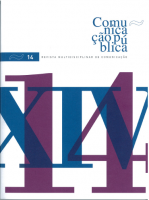Reasons and possible constraints resulting from the lack of an aggregating concept for the theme of "media education"
DOI:
https://doi.org/10.4000/cp.580Keywords:
media education, dispersion of names, reasons, constraints, justificationsAbstract
Although one of the investigation trends in “Media Education” go towards the creation of a conceptual framework for media literacy surgery, there isn’t an aggregate concept to define this area. There are several denominations who apparently intended to mean the same thing. With this article it is intended to answer the question: Why isn’t there a single definition to describe “Media Education”? In addition, it is also expected to contribute to an explanatory framework for the existence of this situation, moving forward with any reasons. The aim is also to observe if it sets up a potential embarrassment for the field is stated in terms of research.
Downloads
References
Baptista, V. R. (2009), “Media Literacy and Media Appropriation by Youth”, in EUROMEDUC – Media Literacy in Europe – Controverses, Challenges and Perspectives. Disponível em http://tinyurl.com/76bp9o2. [Acesso em 12 de novembro de 2011.]
Belshaw, D. (2011), The Essencial Elements of Digital Literacy. Disponível em http://tinyurl.com/3jrlqj. [Acesso em 9 de novembro de 2011.]
Buckingham, D. (2003), Media Education: Literacy, Learning andContemporary Culture, Cambridge, Polity Press/Blackwell.
França, UNESCO (1984), L’Éducation aux Médias, Paris, UNESCO.
França, UNESCO (1957), World Illiteracy at Mid-century: A Statistical Study. Monographs on Fundamental Education 11, Paris, UNESCO.
Gonnet, J. (2007), Educação para os Media – As controvérsias Fecundas, Porto, Porto Editora.
Holme, R. (2004), Literacy: An Introduction. Edinburgh, Reino Unido, Edinbourgh University Press.
Jacquinot-Delaunay, G., Carlsson, U., Tayie S., e Pérez-Tornero, J. M. (2008), “Empowerment Through Media Education. An Intercultural Approach”, in Jacquinot-Delaunay, G., Carlsson, U., Tayie S., e Pérez-Tornero, J.M., The International Clearinghouse on Children, Youth and Media, Göteborg University, NORDICOM, pp. 19-33.
Jenkins, H. et al. (2006), An Occasional Paper on Digital Media and Learning ‒ Confronting the Challenges of Participatory Culture: Media Education for the 21st Century, Chicago, The MacArthur Foundation, Disponível em http://tinyurl.com/3ds4on. [Acesso em 12 de abril de 2011.]
Livingstone, S. (2004), “What is media literacy?”, in Intermedia, 32 (3), pp. 18-20. Disponível em http://tinyurl.com/3fvbwhl. [Acesso em 15 de março de 2011.]
Mosco, V. (2006), “Do mito do ciberespaço à economia política da comunicação digital”, in Sousa, H., Comunicação, Economia e Poder, Porto, Porto Editora, pp. 79-101.
Pérez-Tornero, J. M. (ed.) (2007), Comunicação e Educação na Sociedade de Informação – Novas Linguagens e Consciência Crítica, Porto, Porto Editora.
Pérez-Tornero, J. M.; e Varis, T. (2011), Media Literacy and New Humanism, Moscovo, Russian Federation, UNESCO Institute for Information Technologies in Education.
Pinto, M. (2011a), O Nome e a Cois. Disponível em http://tinyurl.com/88oghud. [Acesso em 30 de julho de 2011.]
Pinto, M. (2011b), Informação e Comunicação ‒ Qual a Mais Importante? Disponível em http://tinyurl.com/7qqo6xr. [Acesso em 30 de agosto de 2011.]
Pinto, M., “Correntes da educação para os media em Portugal: retrospectiva e horizontes em tempos de mudança”, in Revista Ibero-Americana, maio-agosto 2003, n.º 32, pp. 119-143. Disponível em http://tinyurl.com/6mggjy4. [Acesso em 19 de outubro de 2010.]
Pinto, M. (coord.) (2011), Educação para os Media em Portugal: Experiências, Actores e Contextos, Lisboa, Entidade Reguladora para a Comunicação Social/CECS, Universidade do Minho.
Portugal, Conselho Nacional de Educação. Recomendação n.º 6/2011, de 30 de dezembro de 2011, “Recomendação sobre Educação para a Literacia Mediática”, in Diário da República, 2.ª série, n.º 250, Ministério da Educação e Ciência, Lisboa, pp. 50942-50947. Disponível em http://tinyurl.com/7xgndvq. [Acesso em 13 de janeiro de 2012.]
Sousa, V. (2011), “A educação para os media na formação inicial de professores”, tese de mestrado em Ciências da Comunicação, Área de Especialização em Informação e Jornalismo, Braga: Universidade do Minho (Portugal).
Wagner, D. (1993), Literacy, Culture, and Development, Becoming Literate in Morocco, Reino Unido, Cambridge University Press.
WOLTON, D. (2009), Informer N’Est Pas Communiquer, Paris, CNRS Éditions.
Downloads
Published
Issue
Section
License
Copyright (c) 2013 Direitos do Autor (c) 2013

This work is licensed under a Creative Commons Attribution-NonCommercial 4.0 International License.
Os conteúdos da Comunicação Pública estão licenciados com uma licença Creative Commons - Atribuição-NãoComercial 4.0 Internacional.


